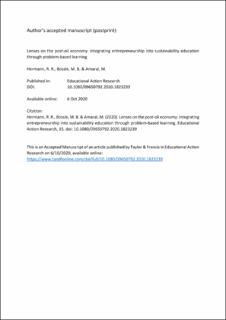| dc.contributor.author | Hermann, Roberto Rivas | |
| dc.contributor.author | Bossle, Marilia Bonzanini | |
| dc.contributor.author | Amaral, Marcelo | |
| dc.date.accessioned | 2020-10-27T13:41:18Z | |
| dc.date.available | 2020-10-27T13:41:18Z | |
| dc.date.created | 2020-10-07T12:37:15Z | |
| dc.date.issued | 2020 | |
| dc.identifier.citation | Hermann, R. R., Bossle, M. B. & Amaral, M. (2020). Lenses on the post-oil economy: integrating entrepreneurship into sustainability education through problem-based learning. Educational Action Research. doi: | en_US |
| dc.identifier.issn | 1747-5074 | |
| dc.identifier.uri | https://hdl.handle.net/11250/2685311 | |
| dc.description.abstract | In the context of enormous global challenges such as climate change, poverty, and the unequal distribution of wealth, sustainability education within higher education has gained momentum as a tool to train a new generation of change agents. In practice, previous research has examined the relationship between sustainability education and entrepreneurship education. Both educational domains share similar teaching and learning frameworks as they both seek to train action-oriented professionals. Yet despite these similarities, there is a knowledge gap regarding course development strategies that can integrate entrepreneurship competencies into sustainability education. Following a classroom action research (AR) approach, we developed a three-week graduate course aimed at an interdisciplinary cohort of students in the social sciences from partner universities in Brazil and Norway. The course integrated a problem-based learning (PBL) framework. As part of the methodology, teachers introduced real-world challenges in the context of a post-extractive economic transition. Working in groups of four to five members, the students provided business solutions framed in a post-oil development context. The results indicate tension points in the integration of the learning principles of PBL along the different phases of PBL, namely during the group formation and problem analysis phases. To tackle these tensions, we propose that this type of course should facilitate early group formation and integrate formative feedback and progressive problem analysis. Our framework contributes to the debate on competence-based frameworks within the sustainability education literature. The framework can also serve as an inspiration for course designers in higher education. | en_US |
| dc.language.iso | eng | en_US |
| dc.publisher | Taylor & Francis | en_US |
| dc.title | Lenses on the post-oil economy : integrating entrepreneurship into sustainability education through problem-based learning | en_US |
| dc.type | Peer reviewed | en_US |
| dc.type | Journal article | en_US |
| dc.description.version | acceptedVersion | en_US |
| dc.subject.nsi | VDP::Samfunnsvitenskap: 200::Pedagogiske fag: 280::Fagdidaktikk: 283 | en_US |
| dc.source.pagenumber | 27 | en_US |
| dc.source.journal | Educational Action Research | en_US |
| dc.identifier.doi | 10.1080/09650792.2020.1823239 | |
| dc.identifier.cristin | 1837892 | |
